On March 22nd, 2016, after a nine and a half hour long flight from Mumbai, I landed at the Brussels Airport an hour before terrorists detonated two of their three bombs. By now, you've likely read all about the facts of what happened. Four terrorists detonated three bombs, two at the Brussels Airport and one inside the Maelbeek Metro. 31 people were killed (three of those deaths belonging to the suicide bombers) and approximately 330 people were severely injured. You've also probably already read about the history of terrorism in Brussels, but what you haven't read is a first-hand account of what the passengers who were suddenly stranded in Brussels with little information and nowhere to go had to go through.
This is that story. This is what my family and I, along with the thousands of others that were stuck in Brussels, dealt with during the three days we were in Brussels, from the failures to small successes.
An hour after my family and I landed in Brussels, while we were waiting at our departure gate to catch our flight home to Toronto, we suddenly saw a rush of people coming our direction. We asked someone what was going on, and this is what we were told. "We don't know. There was an explosion of some kind. We were told to come to this part of the terminal." A few minutes later, we saw an even larger crowd, but this time they were running looking visibly scared. It was 8:05am, and the second bomb had gone off, but at this point we still didn't know everything.

It wasn't until we heard, "Emergency. Evacuate the terminal. Emergency. Evacuate the terminal," coming over the P.A. system did we start to worry. This is when several airport officials began yelling at the large crowd to drop everything and run towards the tarmac.
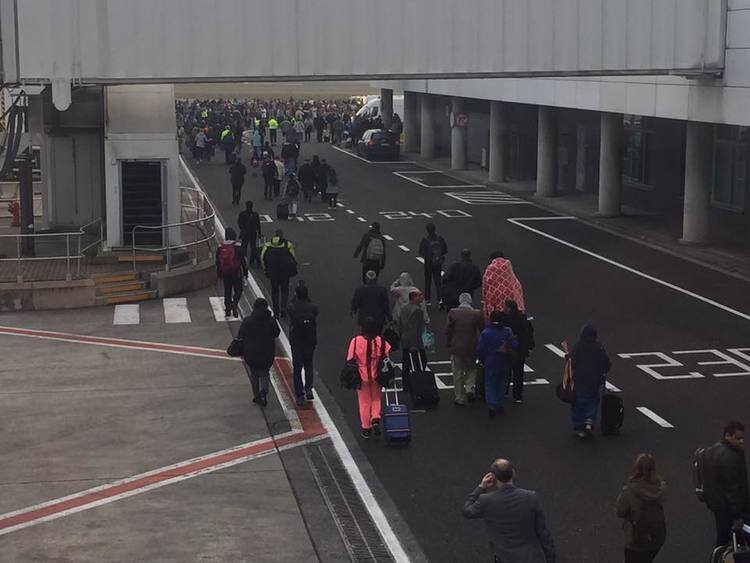
Now, having just come from India, where the temperatures hover around 35°C, we had packed our warmer clothing in our luggage, not thinking we'd need it until we reached Toronto. We weren't alone in thinking that, because as we went outside into the 2°C weather, hundreds of us were freezing. We stood out there for an hour, and the crowd only grew. I never realized how many people are in an airport at any given point in time until I saw a constant flow coming out onto the tarmac. While we were standing there, we saw several people walking towards airport ambulances, covered in blood. "We heard some shots fired, I think. And someone yelling something in Arabic, right before the blasts went off." Again, thinking that this was just the talk of someone who was scared, I listened, taking in what they were saying with a pinch of salt.
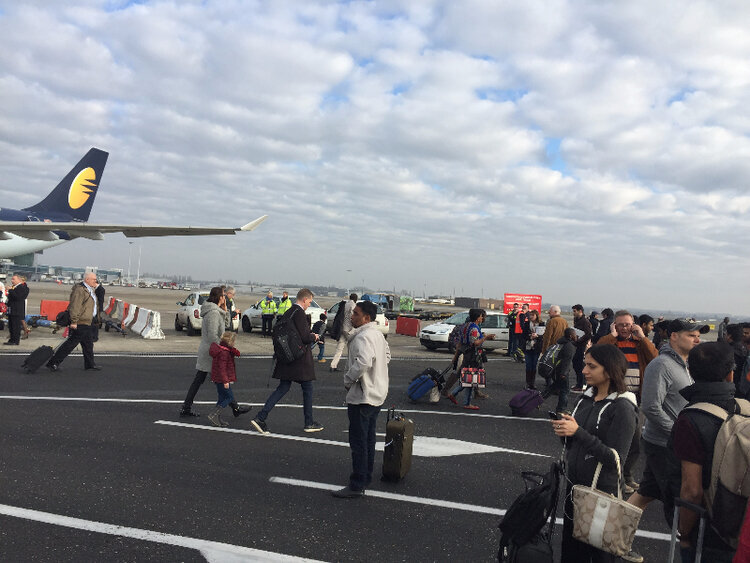
Finally, the airport brought shuttle busses for us to get inside. They were taking us to an aircraft hanger at the other end of the airport, and we didn't know it at the time, but we were going to be inside that hanger for the next eight hours. The hanger, while providing us some cover from the biting wind, did little to dispel the pervasive cold that seeped right into your bones. Airport staff started bringing out water and blankets little by little, until they could set up an emergency HQ. We were put inside a warm room for the first four hours, until the hanger began to fill up, and they needed that room for children and the elderly.
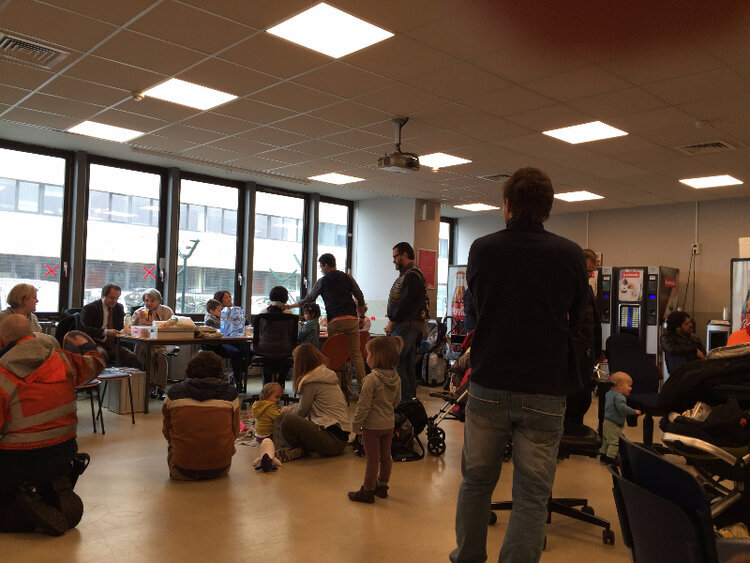

Once we were told to leave, we headed back into the cold hanger for the next four hours. Food and water was scarce, but airport workers kept the flow of blankets coming to provide some semblance of warmth. While we waited, the crowd of people only began to grow, and we still weren't getting any more information. We knew at this point that there had been terrorist activity, and that two bombs had been set off. But we didn't know how many bombs there were, and if there were any more terrorists left in the building, or if they were armed. Everyone was on edge, and a few fights broke out over blankets and water. It wasn't until they brought out the space heaters for everyone to huddle around did it hit us that we were likely going to be stuck in Brussels for sometime.
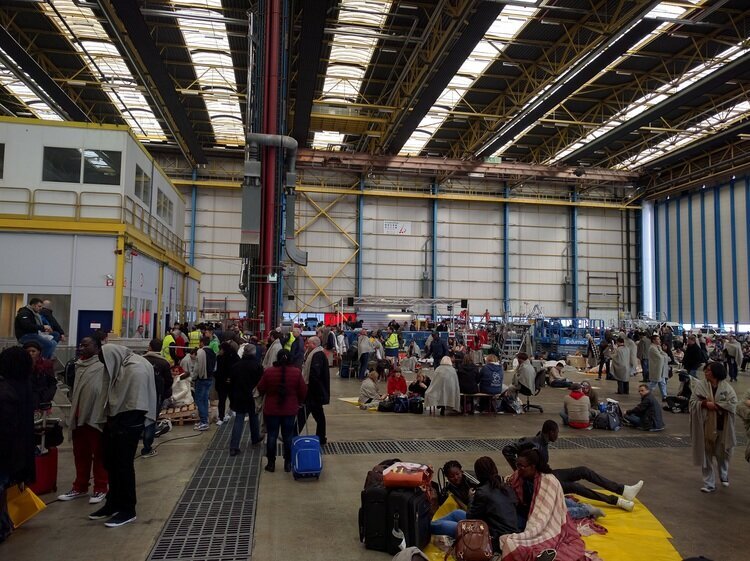
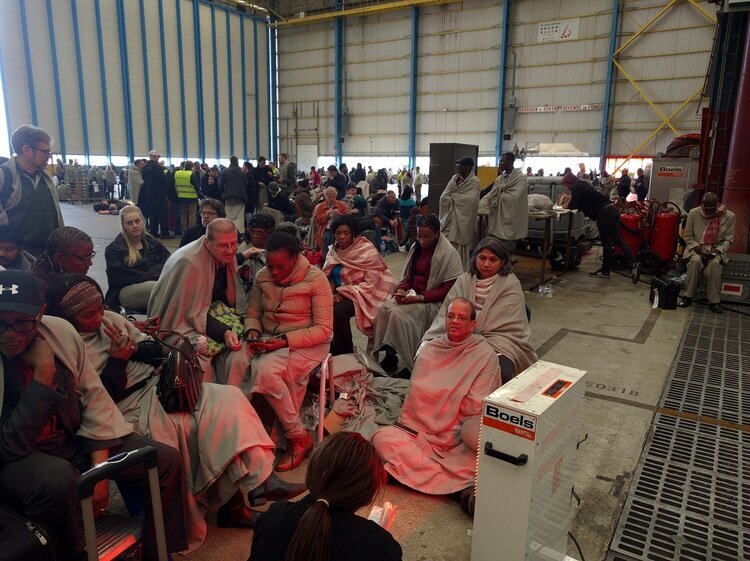
At around 6pm, we were finally told that we were going to be evacuating the airport hanger, and heading to another facility. An "event hall that's warm and has beds and food." We began our slow walk to the other side of the hanger, only be met with everyone else that were also trying their very best to get the hell out of Dodge. The airport had arranged for shuttle busses. The first large group of 1,000-plus people were taken to a military base. Our group of around 1,500 people were taken into a town called Leuven, approximately 30km away from Brussels. We crowded onto the shuttle buses, and took the half hour journey into Leuven.
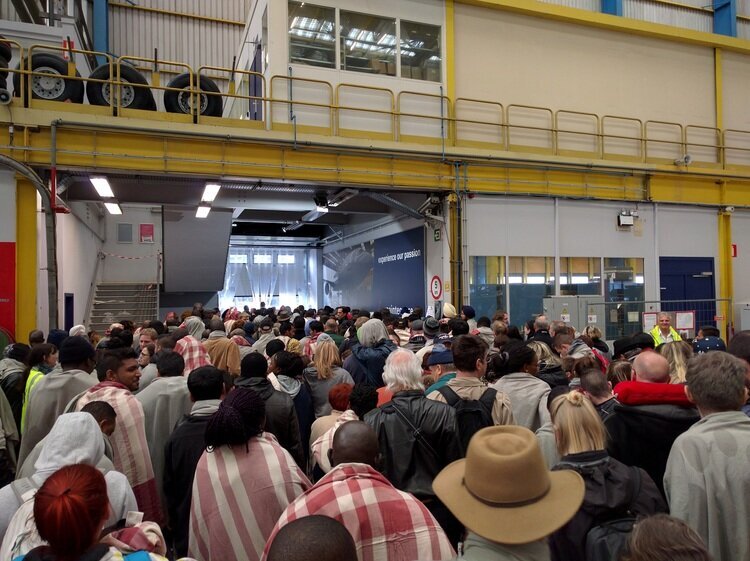
Airport officials were telling people to leave their luggage behind, but no one listened, opting to haul large suitcases and carry-on baggage through the crowd. The passengers who did listen, or the passengers who airport officials were able to enforce that rule upon, had to leave their luggage behind, unsure what would happen to it. Luckily, I was able to keep my laptop bag with me. I suppose why it took so long for the airport to get us out is because they needed to find several places outside of Brussels that could hold thousands of passengers. We heard of groups going into Antwerp, our group going into Leuven, and others into military bases - hey needed to make sure those places were secure, as well as ensure that the roads were empty for the convoy of buses and police cruisers. I remember how eerie it felt, being inside a convoy on completely empty roads; not a single car in sight. In a few hours, Brussels had become totally shut down.
When we finally arrived in Leuven, we entered the event hall, where we had to stand for another hour or so in line, waiting to register. We had to write down our names, nationality, airline, and destination, and with 1,500 people, that can take some time, especially when a large percentage is elderly. While we were in line, we began to hear rumblings of unhappiness; people were becoming frustrated with how slow and seemingly disorganized everything was. After sometime, we finally managed to register and find ourselves a cot before grabbing some food. While my parents sat down and ate, I helped unload a truck full of cots and blankets. In about an hour, we unloaded 1,200 cots and around the same number of blankets.
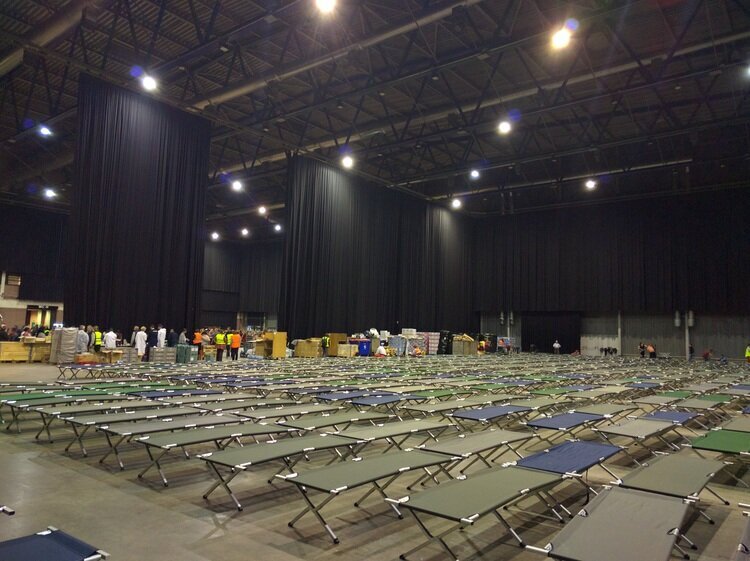
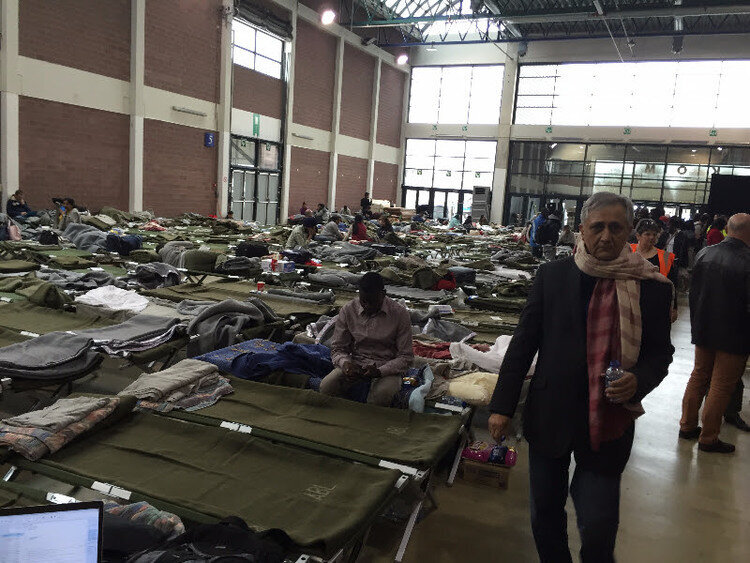
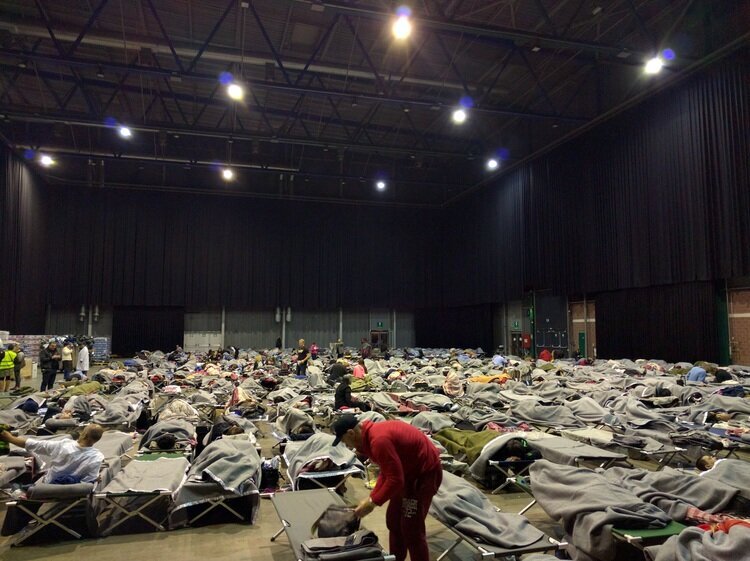
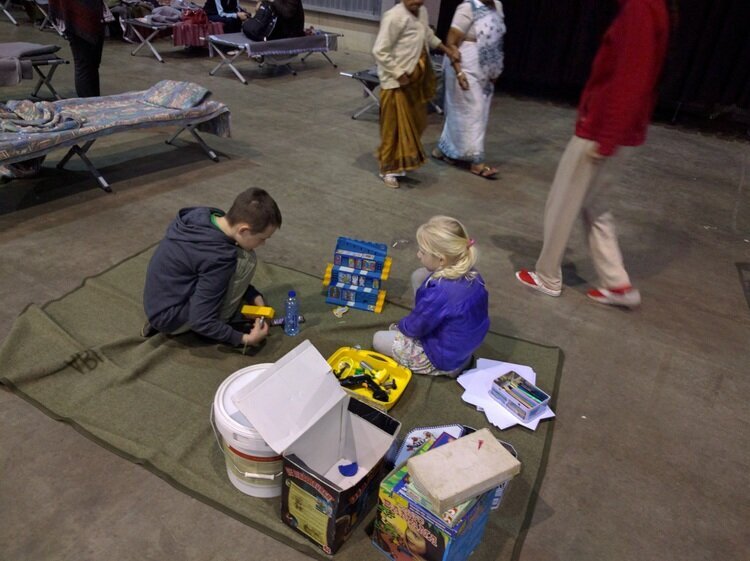
It wasn't until around midnight were we able to begin thinking of sleep. We had just started hearing stories of what people saw and heard during the attack. As this one family was checking in their luggage, the first explosion went off. They were far enough away from the blast that they were okay, but the saw a man with a massive gash across his chest, bleeding profusely. Another man saw a group of school children covered in tiny red dots, from where the glass and nail shrapnel had embedded into their skin, with their teacher either dead or knocked out right next to them. Another guy said he saw one family. The mother and newborn were at the counter, and the father chasing the older kid down because he got away. The father and older kid survived, but the mother and infant didn't.
We woke up the next morning at around 6am. No one could really sleep, but there wasn't much else we could do besides wait. At around 10am, representatives from the Indian, American and British embassies showed up, followed not long after by representatives from United, American, and Brussels Airlines. My family and I were flying via Jet Airways, and by noon, they still hadn't shown up. While my family and I waited, we realized that our airline had by far the most passengers - 800 in total, where as United, Brussels and American had less than 200 each. It was easier for them to coordinate with other airlines, such as Air Canada, to shuttle their passengers into other towns like Amsterdam and Frankfurt, and send them to their next destination.
At around 1pm, our airline did show up, but they had no information for us. Being a smaller airline, they had fewer planes in the air, and given that many of their passengers were traveling from India into the US, they needed visas, many of which had been left behind in Brussels during the attack. Jet decided to tend to those passengers without any documents first, and after two hours, they still had no information for us. There were talks of trying to get their planes out from Brussels and into Amsterdam, but that wasn't a certainty.
While we continued to wait, my family, along with other Canadians, wondered why we hadn't heard from the Canadian Embassy at this point. Several of us called the Embassy in Belgium, but we were told repeatedly that there was little the Embassy could do. A few Canadians were even told to contact the American Embassy. My dad, again with several other Canadians, while I was on the phone with someone from the Embassy, tried contacting Stephane Dion's office in Ottawa, and left several voicemails, only to have none of them returned. We even went so far as to call the Global Affairs office, but again, we were told to simply wait.
It wasn't until we contacted the CBC and the Toronto Star did we finally hear back from the Embassy. The same lady that I had spoken to on the phone actually asked me if I would like someone to come to the event hall that we were staying at. At this point we were all dumbfounded. This is around the time that we finally heard back from our airline, Jet Airways. Without any help from the Embassy, they had arranged a hotel in Noordwijkerhout, a town 34km outside of Amsterdam, for all their passengers to stay in that night. They had also been able to get their three planes out from Brussels so that they could fly their passengers out.
Around 5pm, an hour before we were to leave Leuven, three representatives from the Canadian Embassy finally arrived. This is when my dad and I did a Skype interview with Ali Chiasson from the CBC, regarding everything that was going on. We were told by her that until we contacted the CBC, they too were not getting any information from the government, or from Brussels itself. We were her first source of on-the-ground news. I walked her through the event hall, where we were staying, the food and washroom conditions, and how we had felt abandoned by our government and Embassy.
Immediately after we finished our Skype interview with Ali, we boarded a coach bus and drove three hours into Noordwijkerhout, where we spent the night in a hotel and had our first shower in two days. After that, it was more or less smooth sailing. There were a few hiccups with Jet Airways - the flight staff was absolutely amazing, but the overall management did drop the ball quite a few times. When we did eventually land in Pearson, the airline had set up an area where passengers could fill out forms with their checked in baggage tags, so that when Brussels does open up again, Jet Airways could ship us our luggage. We were in that line for two hours, because even though they had 24 hours to prepare, they were understaffed and overwhelmed.
Now, this is the part where I begin talking about some of the failures of what happened. These failures do not include the Belgian Red Cross, or the literal army of volunteers that came from all over to help the stranded passengers. No, for everything the Belgians did, I am eternally grateful. Inspite of all the chaos and stress of the situation, every single person was absolutely delightful and calm under all the pressure. Given what was going on, we were not cold. We were not hungry. We were relatively comfortable. I think that it says a lot about the Belgians that they even set up a clothing donation box, which was useful when babies needed diapers and the elderly jackets. The level of care and attention to detail that we were given was absolutely outstanding. However, the downside to having the Belgians taking care of us so well is that our Embassy and the Canadian government did absolutely nothing.
Remember when I said we had called Stephane Dion's office, but heard nothing back? Well, his office issued a statement saying that they have "no reports of any Canadian citizens being affected by the incidents." Simultaneously, the Canadian Embassy was issuing statements, saying, "We were being told our citizens were being looked after." In a sense, yes, we were, but when the Embassy for Sierra Leone shows up, and Canada is nowhere to be found, for lack of a stronger word, it's frustrating.
The fact that the Embassy did not show up until the very last second is beyond me. The fact that two different organizations were saying two completely different things regarding several hundred Canadian citizens stuck in a foreign country during a high-alert terrorist attack is beyond me. How does that reflect "no Canadian citizens being affected by the incidents"? How can both the Embassy and the federal government think that a flight coming into Toronto contains zero Canadians? The fact that every other Embassy, from India to America to Sierra Leone, showed up, and did their best to help their citizens stranded without travel documents, and that Canadians were left high-and-dry, that is beyond me.
I'm immensly proud to consider myself Canadian, and proud of my country for all the good it normally does both at home and abroad. However, for the first time in my life, I felt utterly let down by my own government. Yes, mistakes happen, but when they happen on this scale, it's disappointing. I'm all for humanitarian aid, and for helping refugees escape crisis situations, but when the Canadian government is putting up thousands of refugees in hotel rooms and could not be bothered with its own citizens stranded abroad - that is beyond frustrating. If the government is unable to balance the two, then something has to give.
To add insult to injury, if Canada had stepped in, the government would have sent us an invoice to cover the costs. To break that down, currently the government is assisting thousands of refugees, putting them up in hotels, meanwhile, Canadian citizens have to take care of their own humanitarian crisis bills within 30 days of receiving said invoice.
If it were not for the Belgians and our airline, Jet Airways, my family and I would still likely be stuck in Brussels, and we were lucky in many regards. We didn't lose our passports, and unlike many Indians trying to travel to America, we didn't need a VISA. We were able to get out of Brussels, and get home safely, but so many of the other passengers were, and possibly still are, stuck in limbo without their travel documents. They can't go home, nor can they go to the country they wanted to visit.
It's not a matter of me and my family being uncomfortable for a few days. It's that a large percentage of travelers were elderly, and in dire need of assistance. That there's only so much an army of untrained volunteers and a stretched-thin Red Cross can do. That the government and Embassy should have stepped up, offering to take the passengers out of the city into other airport and out of the country. If England and America can get their citizens into Frankfurt and then home, why couldn't Canada?
In the end, my family and I are home, safe now. Our luggage is still somewhere in Brussels, but given the fact that we're alive and healthy, that's a relatively small, inconsequential price to pay. But I am still so incredibly angry with our government. I am still so incredibly angry with the lack of concerted effort to bring us home as quickly and safely as possible. I am still so incredibly angry at the loss of life.
I'm grateful and happy to be home, but I am still just so incredibly angry.

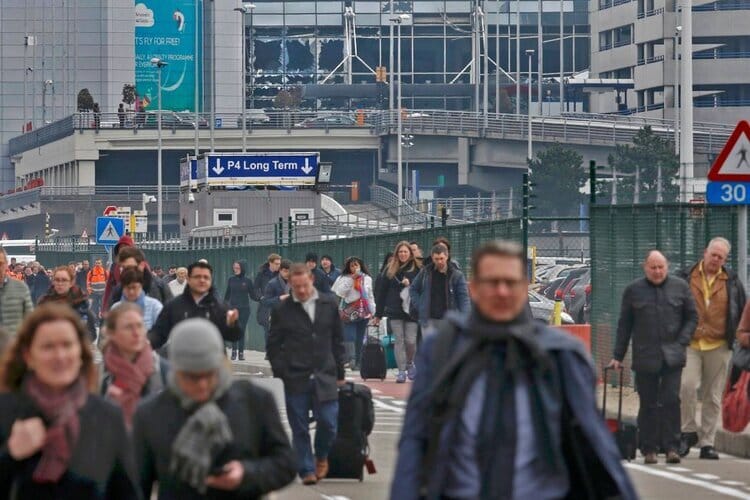

Member discussion: